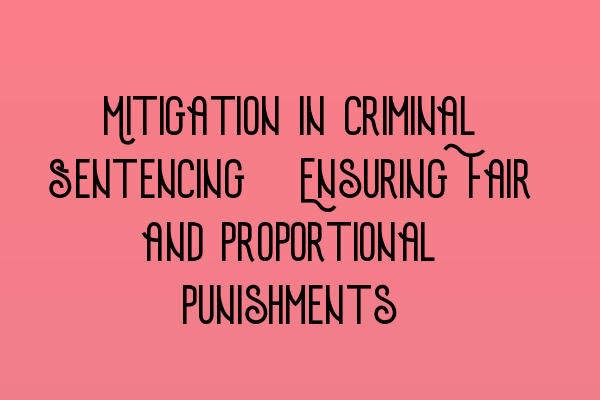Mitigation in Criminal Sentencing: Ensuring Fair and Proportional Punishments
Introduction
When it comes to criminal sentencing, the principle of proportionality plays a crucial role in ensuring fair and just outcomes. Mitigation, which involves presenting evidence and arguments to reduce the severity of a sentence, is a significant aspect of the criminal justice system in the UK. In this article, we will explore the importance of mitigation in criminal sentencing and how it helps to achieve a balanced and equitable legal framework.
Understanding Mitigation
Mitigation is the process by which a defendant, through their legal representative, presents evidence and arguments to persuade the court to impose a less severe sentence. This can be based on various factors, such as the defendant’s personal circumstances, their remorse, cooperation with the investigation, or any other relevant considerations that may warrant a more lenient punishment. The aim is to present a holistic picture of the defendant, highlighting their positive attributes and mitigating circumstances that may have contributed to their actions.
Benefits of Mitigation
1. Fairness: Mitigation ensures that all aspects of the defendant’s case are taken into account, including their background, character, and personal circumstances. This helps to prevent overly harsh sentences that do not consider the individual circumstances of the defendant.
2. Proportionality: By presenting mitigating evidence, the defendant can seek a sentence that is commensurate with their level of culpability. It allows the court to weigh the seriousness of the offense against the mitigating factors, ultimately leading to a more proportional punishment.
3. Rehabilitation: Mitigation can also highlight the defendant’s potential for reform and rehabilitation. By demonstrating remorse, cooperation, and willingness to change, the defendant can advocate for a sentence that prioritizes their future prospects of reintegrating into society.
Effective Strategies for Mitigation
1. Expert Testimonies: Engaging expert witnesses who can provide professional insights into the defendant’s mental health, substance abuse issues, or any other relevant areas can significantly strengthen the mitigation argument.
2. Character References: Letters from family, friends, or colleagues can provide the court with valuable insights into the defendant’s character, their contributions to the community, and their positive attributes.
3. Personal Statement: Allowing the defendant to address the court directly through a personal statement can humanize their case and demonstrate their remorse, insight into their actions, and commitment to change.
Conclusion
Mitigation plays a vital role in ensuring fair and proportional punishments in criminal sentencing. By presenting a comprehensive and persuasive argument for mitigation, defendants can secure sentences that are tailored to their individual circumstances. It is essential for solicitors and legal professionals to be proficient in the art of mitigation, as it fosters a more equitable criminal justice system.
SQE Exam Prep: Essential Study Materials for Aspiring Solicitors
Demystifying the Solicitors Qualifying Examination Format
SQE Exam for International Lawyers: Challenges and Success Strategies
LLC Formation Made Simple: Step-by-Step Guide for UK Entrepreneurs
LLC Formation: A Step-by-Step Guide for UK Entrepreneurs
